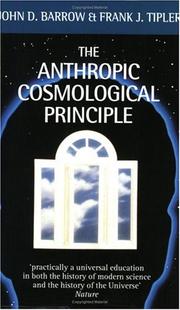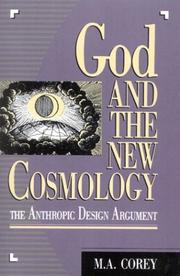| Listing 1 - 10 of 13 | << page >> |
Sort by
|
Book
ISBN: 0391037447 Year: 1992 Publisher: New Jersey Humanities press
Abstract | Keywords | Export | Availability | Bookmark
 Loading...
Loading...Choose an application
- Reference Manager
- EndNote
- RefWorks (Direct export to RefWorks)
Anthropic principle --- Christianity --- God --- Religion and science --- Philosophy --- Proof
Book
ISBN: 2200211279 9782200211271 Year: 1994 Publisher: Paris: Armand Colin,
Abstract | Keywords | Export | Availability | Bookmark
 Loading...
Loading...Choose an application
- Reference Manager
- EndNote
- RefWorks (Direct export to RefWorks)
Anthropic principle --- Cosmology --- Teleology --- Principe anthropique --- Cosmologie --- Finalité --- --Anthropocentrisme --- --Cosmology --- #gsdbf --- Astronomy --- Deism --- Metaphysics --- Finalité --- Anthropocentrisme
Book
ISBN: 0391036947 9780391036949 Year: 1991 Publisher: Atlantic Highlands (New Jersey): Humanities press international,
Abstract | Keywords | Export | Availability | Bookmark
 Loading...
Loading...Choose an application
- Reference Manager
- EndNote
- RefWorks (Direct export to RefWorks)
Anthropic principle --- Evolution --- Human beings --- Man --- Homo sapiens --- Human race --- Humanity (Human beings) --- Humankind --- Humans --- Mankind --- People --- Hominids --- Persons --- Philosophy --- Creation --- Emergence (Philosophy) --- Teleology --- Anthropic cosmological principle --- Cosmology --- Anthropic principle. --- Evolution. --- Human beings.
Book
ISBN: 0895267403 Year: 1990 Publisher: Washington Regnery Gateway
Abstract | Keywords | Export | Availability | Bookmark
 Loading...
Loading...Choose an application
- Reference Manager
- EndNote
- RefWorks (Direct export to RefWorks)
Anthropic principle --- Evolution --- Free will and determinism --- God --- Human beings --- Liberty --- Philosophy, Modern --- Religion and science --- Proof, Teleological --- Religious aspects --- Christianity

ISBN: 0203953460 113671099X 1136710973 9781136710995 9780203953464 0415938589 9780415938587 9781136711008 1136711007 9781136710957 1136710957 0415938589 9780415938587 0415883946 9780415883948 9781136710971 Year: 2002 Publisher: New York, N.Y. Routledge
Abstract | Keywords | Export | Availability | Bookmark
 Loading...
Loading...Choose an application
- Reference Manager
- EndNote
- RefWorks (Direct export to RefWorks)
Methodology. --- Anthropic principle. --- Selectivity (Psychology) --- Observation (Scientific method) --- Anthropic cosmological principle --- Cosmology --- Teleology --- Philosophy --- Research --- Attention, Selective --- Selective attention --- Selective perception --- Cognition --- Human information processing --- Perception --- Science --- Methodology --- Metaphysics --- Humanities Methodology
Book
ISBN: 9789004465954 9789004468344 9004465952 900446834X Year: 2021 Volume: 170 Publisher: Leiden: Brill,
Abstract | Keywords | Export | Availability | Bookmark
 Loading...
Loading...Choose an application
- Reference Manager
- EndNote
- RefWorks (Direct export to RefWorks)
In this volume, Costache endeavours to map the world as it was understood and experienced by the early Christians. Progressing from initial fears, they came to adopt a more positive view of the world through successive shifts of perception. This did not happen overnight. Tracing these shifts, Costache considers the world of the early Christians through an interdisciplinary lens, revealing its meaningful complexity. He demonstrates that the early Christian worldview developed at the nexus of several perspectives. What facilitated this process was above all the experience of contemplating nature. When accompanied by genuine personal transformation, natural contemplation fostered the theological interpretation of the world as it had been known to the ancients.
Nature --- Cosmology, Ancient. --- Anthropic principle. --- Theology --- Religion and science --- Religious aspects --- Christianity --- History of doctrines --- History --- History. --- Bible --- History of Biblical events --- Cosmology, Ancient --- Anthropic principle --- 241.1*1 --- 241.1*1 Theologische ethiek: daden tegenover de cosmos --- Theologische ethiek: daden tegenover de cosmos --- Anthropic cosmological principle --- Cosmology --- Teleology --- Ancient cosmology --- History of controversy --- Nature - Religious aspects - Christianity - History of doctrines - Early church, ca. 30-600. --- Theology - History - Early church, ca. 30-600. --- Religion and science - History. --- Christianity.

ISBN: 0192821474 9780192821478 Year: 1994 Publisher: Oxford: Oxford university press,
Abstract | Keywords | Export | Availability | Bookmark
 Loading...
Loading...Choose an application
- Reference Manager
- EndNote
- RefWorks (Direct export to RefWorks)
Anthropic principle --- Intellect --- Life on other planets --- Man --- Science --- -Human beings --- #GROL:SEMI-130.2:6 --- Homo sapiens --- Human race --- Humanity (Human beings) --- Humankind --- Humans --- Mankind --- People --- Hominids --- Persons --- Natural science --- Science of science --- Sciences --- Extraterrestrial life --- Planets --- Fermi's paradox --- Human intelligence --- Intelligence --- Mind --- Ability --- Psychology --- Mental retardation --- Thought and thinking --- Anthropic cosmological principle --- Cosmology --- Teleology --- Philosophy --- Human beings --- Intellect. --- Cosmologie --- Homme --- Finalité --- Vie extraterrestre --- Philosophie --- Normal science --- Philosophy of science --- Philosophy of nature --- Philosophical anthropology --- Anthropic principle. --- Human beings. --- Life on other planets. --- Philosophy. --- Science - Philosophy
Book
ISBN: 0198519494 9780198519492 Year: 1986 Publisher: Oxford: Clarendon,
Abstract | Keywords | Export | Availability | Bookmark
 Loading...
Loading...Choose an application
- Reference Manager
- EndNote
- RefWorks (Direct export to RefWorks)
Anthropic principle --- Extraterrestrial life --- Fermi's paradox --- Human intelligence --- Mental retardation --- Homo sapiens --- Human race --- Humanity (Human beings) --- Humankind --- Humans --- Mankind --- People --- Hominids --- Anthropic cosmological principle --- Human beings --- Intellect --- Life on other planets --- Science --- Planets --- Intelligence --- Mind --- Ability --- Psychology --- Thought and thinking --- Man --- Persons --- Cosmology --- Teleology --- Normal science --- Philosophy of science --- Philosophy --- Philosophy of nature --- Philosophical anthropology --- Intellect. --- Science - Philosophy

ISBN: 0847678024 0847678016 9780847678020 Year: 1993 Publisher: Lanham (Md.): Rowman & Littlefield,
Abstract | Keywords | Export | Availability | Bookmark
 Loading...
Loading...Choose an application
- Reference Manager
- EndNote
- RefWorks (Direct export to RefWorks)
Anthropic principle --- Antropisch beginsel --- Christianisme et science --- Christianisme et sciences --- Christianity and science --- Geology -- Religious aspects --- Geology and religion --- Godsdienst en wetenschap --- Géologie et religion --- Natural religion --- Natural theology --- Natuurlijke religie --- Principe anthropique --- Religion and science --- Religion et science --- Religion et sciences --- Religion et sciences naturelles --- Religion et technologie --- Religion naturelle --- Religions et sciences --- Science -- Religious aspects --- Science and religion --- Science et christianisme --- Science et religion --- Sciences et christianisme --- Sciences et religion --- Sciences et religions --- Sciences naturelles et religion --- Technologie et religion --- Wetenschap en godsdienst --- God --- Anthropic principle. --- Natural theology. --- Proof, Cosmological. --- Proof, Teleological. --- 215 --- 211.1 --- #GROL:SEMI-111.92 --- Godsbewijzen: ontologisch argument; deontologisch argument;--via de wetenschap; via de kunst --- Proof [Cosmological ] --- Proof [Teleological ] --- God - Proof, Cosmological. --- God - Proof, Teleological. --- Anthropic cosmological principle --- Geology --- Science --- Theology, Natural --- Teleological argument --- Cosmological argument --- Proof, Cosmological --- Proof, Teleological --- Religious aspects --- Cosmology --- Teleology --- Apologetics --- Religion --- Theology --- Philosophy of nature --- Intelligent design (Teleology)
Book
ISBN: 3110440288 311044027X 3110441438 Year: 2015 Publisher: De Gruyter
Abstract | Keywords | Export | Availability | Bookmark
 Loading...
Loading...Choose an application
- Reference Manager
- EndNote
- RefWorks (Direct export to RefWorks)
What is Time? Assuming no prior specialized knowledge by the reader, the book raises specific, hitherto overlooked questions about how time works, such as how and why anyone can be made to be, at the very same instant, simultaneous with events that are actually days apart. It examines abiding issues in the physics of time or at its periphery which still elude a full explanation - such as delayed choice experiments, the brain's perception of time during saccadic masking, and more - and suggests that these phenomena can only exist because they ultimately obey applicable mathematics, thereby agreeing with a modern view that the universe and everything within it, including the mind, are ultimately mathematical structures. It delves into how a number of conundrums, such as the weak Anthropic Principle, could be resolved, and how such resolutions could be tested experimentally. All its various threads converge towards a same new vision of the ultimate essence of time, seen as a side effect from a deeper reality.
Physics --- Physical Sciences & Mathematics --- Atomic Physics --- Space and time. --- Space of more than three dimensions --- Space-time --- Space-time continuum --- Space-times --- Spacetime --- Time and space --- Fourth dimension --- Infinite --- Metaphysics --- Philosophy --- Space sciences --- Time --- Beginning --- Hyperspace --- Relativity (Physics) --- Popular science, time, mystery of time, mathematical universe, space-time, quantum, delayed choice, Bell's inequality, wave function, the brain's perception of time, saccades, anthropic principle.
| Listing 1 - 10 of 13 | << page >> |
Sort by
|

 Search
Search Feedback
Feedback About UniCat
About UniCat  Help
Help News
News